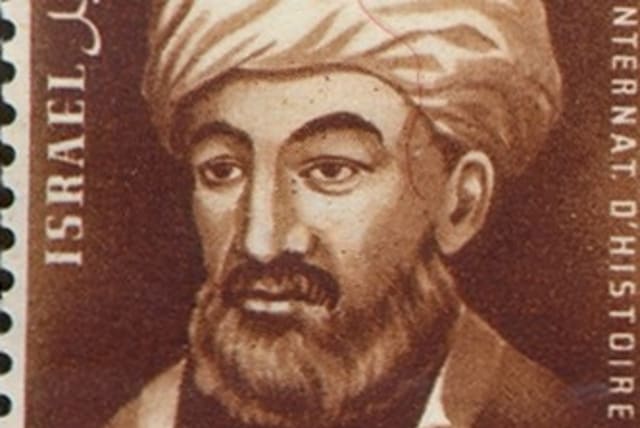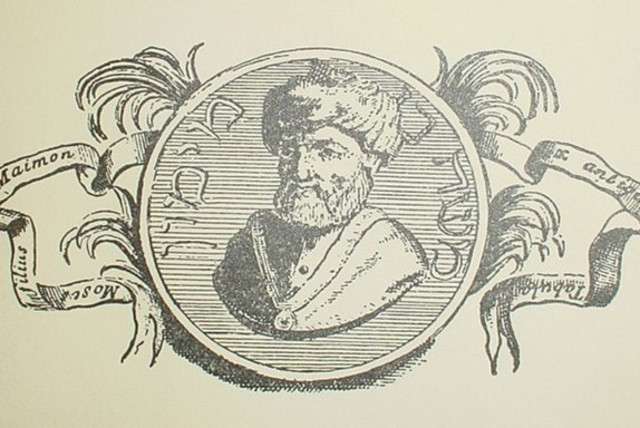Medieval Jewish thinker Maimonides wrote in Romance language - research

Maimonides, born Moses ben Maimon and also known as the Rambam, is one of the great scholars and thinkers of his time, even among non-Jewish contemporaries.
The great Medieval Jewish scholar and philosopher Maimonides was thought to have written exclusively in Hebrew and Judeo-Arabic, but a new discovery has confirmed that he also wrote in the local Romance alphabet, the University of Cambridge reported last week.
The discovery was made by José Martínez Delgado, a visiting researcher at the University of Cambridge in the UK, and based on a nearly 1,000-year-old scrap of paper from the Cairo Genizah collection.
The accuracy of Delgado's discovery was then confirmed by Amir Ashur of Israel's Tel Aviv University.
Maimonides and Romance: A great Medieval Jewish thinker and evolving linguistic trends
Maimonides, born Moses ben Maimon and also known as the Rambam, is one of the great scholars and thinkers of his time, even among non-Jewish contemporaries.
Born in Cordoba in 1135 during the later years of the Golden Age of Spanish Jewry, Maimonides would establish himself as a revolutionary and authoritative scholar among Jews and Gentiles alike.
His seminal work the Mishneh Torah is heralded as one of Judaism's most authoritative legal and ethical codexes and his magnum opus, the Guide for the Perplexed, remains the most influential attempt to reconcile Judaism’s sacred texts with scientific truths. His philosophical work, done in the tradition of Aristotelian thought, has left a profound impact on the further development of Medieval philosophy all throughout Europe.
But it was widely believed that he only wrote in Medieval Hebrew and in Judeo-Arabic, which is Arabic written in Hebrew letters.
Delgado, however, believed differently.
To understand why, it's important to understand what sources he was working with: The Cairo Genizah.
This is an archive of around 400,000 Jewish manuscript fragments that were stored in the genizah (storeroom) of a synagogue in Old Cairo, spanning nearly the entirety of Medieval Jewish history in the Middle East, North Africa and Iberia.
Most of these documents were written in Hebrew, Arabic and Aramaic, but some of these documents seemed to have Romance dialects.
Specifically, as previous research described, there were words written in Judeo-Spanish.
At the time of that discovery, this document designated T-S NS 163.57, was stated to be of unknown authorship. In 2022, however, Delgado and Ashur confirmed that this was Maimonides's handwriting.
This was determined by taking a look at other examples of him writing the same words that appeared in the fragment.
The document shows normal writing, with the Romance language writing included as a translation below certain words.
So, does this mean that Maimonides spoke Spanish?
No. In fact, it isn't even clear if this was in Spanish.
The Spanish language, as we know it today, is itself derived from millennia of linguistic evolution from Latin as part of the Romance language family. While these words are certainly related to Spanish, it is unclear if they predated the Spanish language per se, only that they were a Romance dialect.
In particular, as Delgado noted, while some of the words seem very similar to Spanish, the plurals have more in common with Italian.
These words range from colors, foods, scents and actions.
But this raises another question: Why did Maimonides choose to write in a Romance dialect at all?
To this, Delgado has his own theory.
"He was a physician, with students, so perhaps he was gathering the terms for a medical or educational reason, or testing himself on his vocabulary!"
Jerusalem Post Store
`; document.getElementById("linkPremium").innerHTML = cont; var divWithLink = document.getElementById("premium-link"); if (divWithLink !== null && divWithLink !== 'undefined') { divWithLink.style.border = "solid 1px #cb0f3e"; divWithLink.style.textAlign = "center"; divWithLink.style.marginBottom = "15px"; divWithLink.style.marginTop = "15px"; divWithLink.style.width = "100%"; divWithLink.style.backgroundColor = "#122952"; divWithLink.style.color = "#ffffff"; divWithLink.style.lineHeight = "1.5"; } } (function (v, i) { });

